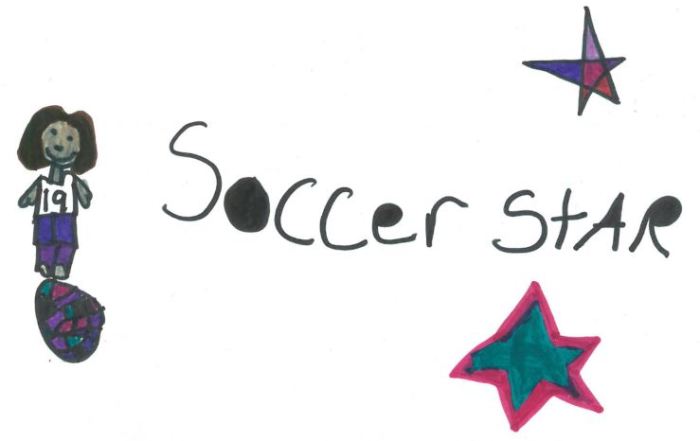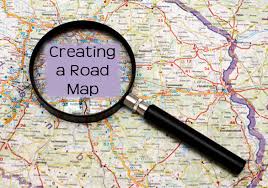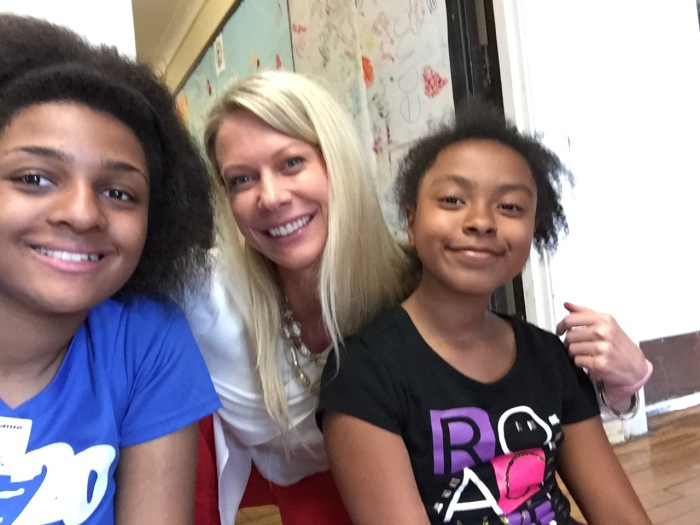
Spring Cleaning is inevitable, but Girls in the Game’s spring cleaning this year took on a much greater purpose as we are getting ready for our move to Douglas Park. After 13 years we are leaving our beloved home at Union Park, which means digging through A LOT of boxes. We’ve spent the last couple of Fridays slogging through old paperwork that needs to be shredded, digging through bins of VHS tapes and uncovering other treasures from the pre-digital age. My favorite find of the cleaning days is a stack of girls’ drawings from an After School program in 2010.
The girls completed two different body-image exercises with their coaches. One was entitled “This Is Who I Am,” where they drew a picture of themselves and described their personalities. The second, called “Self-Portrait”, instructed the girls to fill out two halves of a circle with words that described first “How I see me…” and then “How others see me…”
Looking through the first exercise, what struck me most was our girls’ confidence in themselves and their abilities.
One girl described herself as “outgoing, smart, intelligent, creative, fun, sometimes sensitive, stylish, shy, colorful in different ways, really good singer & dancer, like baseball the most”
Another declared, “I am an idea person. I’m a gossip queen. I’m good at sports”
A third said, “Smart, likes to laugh, sweet, funny, respectful, trustful, nice, kind, likes softball, cares”
Then, I came to the second exercise, where the girls had to fill out how they saw themselves and then how they thought others saw them. This is just a small sample of the results:
| How I see myself… | How others see me… |
| Pretty, black, nice, smart, long hair, very fast | Ugly, mean, slow, don’t like my long hair, can’t run |
| Fun, funny, blue, calm, lazy, energetic, crazy, active | Lazy, mean, ugly, weak-minded, non-friendly |
| Silly, funny, smart, intelligent, short, bright, active | Mean, ugly, funny, crazy, fun, artist, happy, sometimes mad and sad |
| Friendly, nice, awesome, cool, smart, cute, respectful | Crazy, mean, funny, cuckoo, uncool |
The first column read similar to the first exercise; girls were confident in themselves, their abilities and what they had to offer the world. But when it came to the second column, it was hard to find any of the sheets without the word “ugly”. For the vast majority of the papers, the second column was filled with negative words and stereotypes about girls, with a few positive words here and there.
When you look at the second column, it’s obvious that the girls are receiving a different message about the value of girls from the world at large than what they learn at Girls in the Game. Whether it’s their peers, the media as a whole, adults in their lives or their community, the idea that girls are somehow worth less is pretty blatant.
So why was I so excited to find these papers and drawings? Because there is hope that the first column can and will overcome that second column. There is hope within the statements “I am awesome” and “I am bright”. There is clear divide between what our girls think of themselves, and how they think the world sees them. Yet that did not stop them from filling in that first column with those powerful words about themselves, and more importantly, they didn’t go back and cross those powerful words out after filling in the second column. Through this exercise our girls are showing self-worth and an awareness of their own value.

Organizations like Girls in the Game will continue to advocate on behalf of girls through programming, social media, awareness and living out our own mission and values, but the most powerful thing we can do for the girls is to give them the tools they need to advocate for themselves. Through exercises like the ones above, we can engage girls in thoughtful discussions about body-image and the media that they consume. Sports are one of the best avenues for girls to develop a healthy body image and their own physical power, which is yet another “tool” in their self-advocacy toolbox.
As adults we can help them start to parse out their own understanding of their value versus what they hear from the world at large. On our end, we adults have a lot of work to do as we battle against that second column full of negative and appearance-focused ill-informed messages. We can (and should) take steps to change those messages every opportunity we have. I, for one, feel inspired by the girls’ ability to put pen to paper and accurately describe themselves through their own eyes, and I feel even more inspired to do my part alongside Girls in the Game to help them to never stop believing in column one.
 The phone rang this morning and I saw Eileen Fisher on the caller ID. I assumed it was Kim Austad, the manager of the Highland Park Eileen Fisher store and one of my favorite people. I had been thinking about Kim recently, and had it on my list to give her a call to catch up.
The phone rang this morning and I saw Eileen Fisher on the caller ID. I assumed it was Kim Austad, the manager of the Highland Park Eileen Fisher store and one of my favorite people. I had been thinking about Kim recently, and had it on my list to give her a call to catch up.
 I established myself as a “tom-boy” early on, or at least that’s how I thought of myself back then, and managed to find as many opportunities as I could to play with boys. But by the time I made it to the high school level, I started to realize the way society had made me think of my own gender as the weaker, less impressive gender when it came to athletics. But how wrong I was! I started meeting some of the best athletes I had ever met. I started to realize women’s athletics were made up of basketball stars, soccer stars, track stars, and the like. I started taking pride in the fact that I was a girl, and I was proud of how both my fellow athletes and I competed. But even as I started to love the athlete I was becoming—a strong, successful athlete, I still felt the pull to prove myself and to others that I could be as good as a man. I just wanted to be accepted and respected as the athlete I always felt I was.
I established myself as a “tom-boy” early on, or at least that’s how I thought of myself back then, and managed to find as many opportunities as I could to play with boys. But by the time I made it to the high school level, I started to realize the way society had made me think of my own gender as the weaker, less impressive gender when it came to athletics. But how wrong I was! I started meeting some of the best athletes I had ever met. I started to realize women’s athletics were made up of basketball stars, soccer stars, track stars, and the like. I started taking pride in the fact that I was a girl, and I was proud of how both my fellow athletes and I competed. But even as I started to love the athlete I was becoming—a strong, successful athlete, I still felt the pull to prove myself and to others that I could be as good as a man. I just wanted to be accepted and respected as the athlete I always felt I was. I’m proud to be an athlete who identifies as a woman, but when my gender is used to downgrade or minimize my performance as an athlete, that’s when I see it as problematic. When gender becomes a determining factor of my place on the court, when it requires me to be “the other,” the less desired, the less talented athlete, that’s when I’m reminded that I play for the girls, the women, and those whose gender is used as a tool to limit their ability to reach their full athletic potential. So until we are recognized as something other than a sub-genre of the athletic world, I’ll continue to play in those uncomfortable places, the places that try to convince me that I’m weaker, or just eye candy, and better off somewhere else. I’ll play to remind those who wish to excel at a sport have the ability to be a star, no matter what people have to say about it. So until we can change the stigma behind what it means to be an athlete—a woman athlete—I will continue to be the “other” on the basketball court. And quite honestly, I was better and more determined than any of the boys I played with when I first picked up the ball, and somehow, I knew that I just had to keep trying. So I’ll continue to play. I’ll continue to stand in solidarity. And I’ll continue to use my voice to speak up until no athlete is discounted based on their gender.
I’m proud to be an athlete who identifies as a woman, but when my gender is used to downgrade or minimize my performance as an athlete, that’s when I see it as problematic. When gender becomes a determining factor of my place on the court, when it requires me to be “the other,” the less desired, the less talented athlete, that’s when I’m reminded that I play for the girls, the women, and those whose gender is used as a tool to limit their ability to reach their full athletic potential. So until we are recognized as something other than a sub-genre of the athletic world, I’ll continue to play in those uncomfortable places, the places that try to convince me that I’m weaker, or just eye candy, and better off somewhere else. I’ll play to remind those who wish to excel at a sport have the ability to be a star, no matter what people have to say about it. So until we can change the stigma behind what it means to be an athlete—a woman athlete—I will continue to be the “other” on the basketball court. And quite honestly, I was better and more determined than any of the boys I played with when I first picked up the ball, and somehow, I knew that I just had to keep trying. So I’ll continue to play. I’ll continue to stand in solidarity. And I’ll continue to use my voice to speak up until no athlete is discounted based on their gender. Have you ever gone the wrong way? I have. I have walked, driven, biked and taken the ‘L” in the wrong direction; I have also been in a car driving the wrong way down a one way. Or there was one time I missed my exit and only noticed when I couldn’t go any further east without driving into the lake. I drove an hour out of the way in the wrong direction that day; nailed it. These are all funny stories now but at the time I was incredibly frustrated. Google Maps has helped most of us find our way at some point, but what happens when you’re using the wrong map, when you have a map of Boston when you really needed a map for Chicago? No matter how hard you try you’ll still find yourself lost and frustrated, swimming upstream against the current only to find yourself further away from your desired destination.
Have you ever gone the wrong way? I have. I have walked, driven, biked and taken the ‘L” in the wrong direction; I have also been in a car driving the wrong way down a one way. Or there was one time I missed my exit and only noticed when I couldn’t go any further east without driving into the lake. I drove an hour out of the way in the wrong direction that day; nailed it. These are all funny stories now but at the time I was incredibly frustrated. Google Maps has helped most of us find our way at some point, but what happens when you’re using the wrong map, when you have a map of Boston when you really needed a map for Chicago? No matter how hard you try you’ll still find yourself lost and frustrated, swimming upstream against the current only to find yourself further away from your desired destination. At Girls in the Game, like many other organizations, we occasionally find ourselves scratching our heads and holding that figurative map of Boston while we stand in Chicago. Our junior high program is a great example of this. When our number of attendees declined in our junior high After School programs, our program director could have easily blamed our coaches or coordinators or the schools themselves. She could have pushed our staff to try harder, do more and be more enthusiastic, but no matter how much energy we might put into what currently existed we were still driving the wrong way down a one way street. We had great attendance for elementary and high school girls, but something wasn’t quite clicking in our middle school programming. So Beth utilized internal and external resources by organizing a focus group of full time staff, coaches, Girls in the Game alumni and current teen squad members, to view the issue from a different angle. And we all learned the problem was that we needed to meet the girls right where they were, not where we wanted them to be. It was time to pick up the map the girls were holding that offered us insight into their lives and their needs, similar to the boy I worked with at camp years ago. It didn’t matter what I thought he needed, it mattered what he actually needed.
At Girls in the Game, like many other organizations, we occasionally find ourselves scratching our heads and holding that figurative map of Boston while we stand in Chicago. Our junior high program is a great example of this. When our number of attendees declined in our junior high After School programs, our program director could have easily blamed our coaches or coordinators or the schools themselves. She could have pushed our staff to try harder, do more and be more enthusiastic, but no matter how much energy we might put into what currently existed we were still driving the wrong way down a one way street. We had great attendance for elementary and high school girls, but something wasn’t quite clicking in our middle school programming. So Beth utilized internal and external resources by organizing a focus group of full time staff, coaches, Girls in the Game alumni and current teen squad members, to view the issue from a different angle. And we all learned the problem was that we needed to meet the girls right where they were, not where we wanted them to be. It was time to pick up the map the girls were holding that offered us insight into their lives and their needs, similar to the boy I worked with at camp years ago. It didn’t matter what I thought he needed, it mattered what he actually needed.